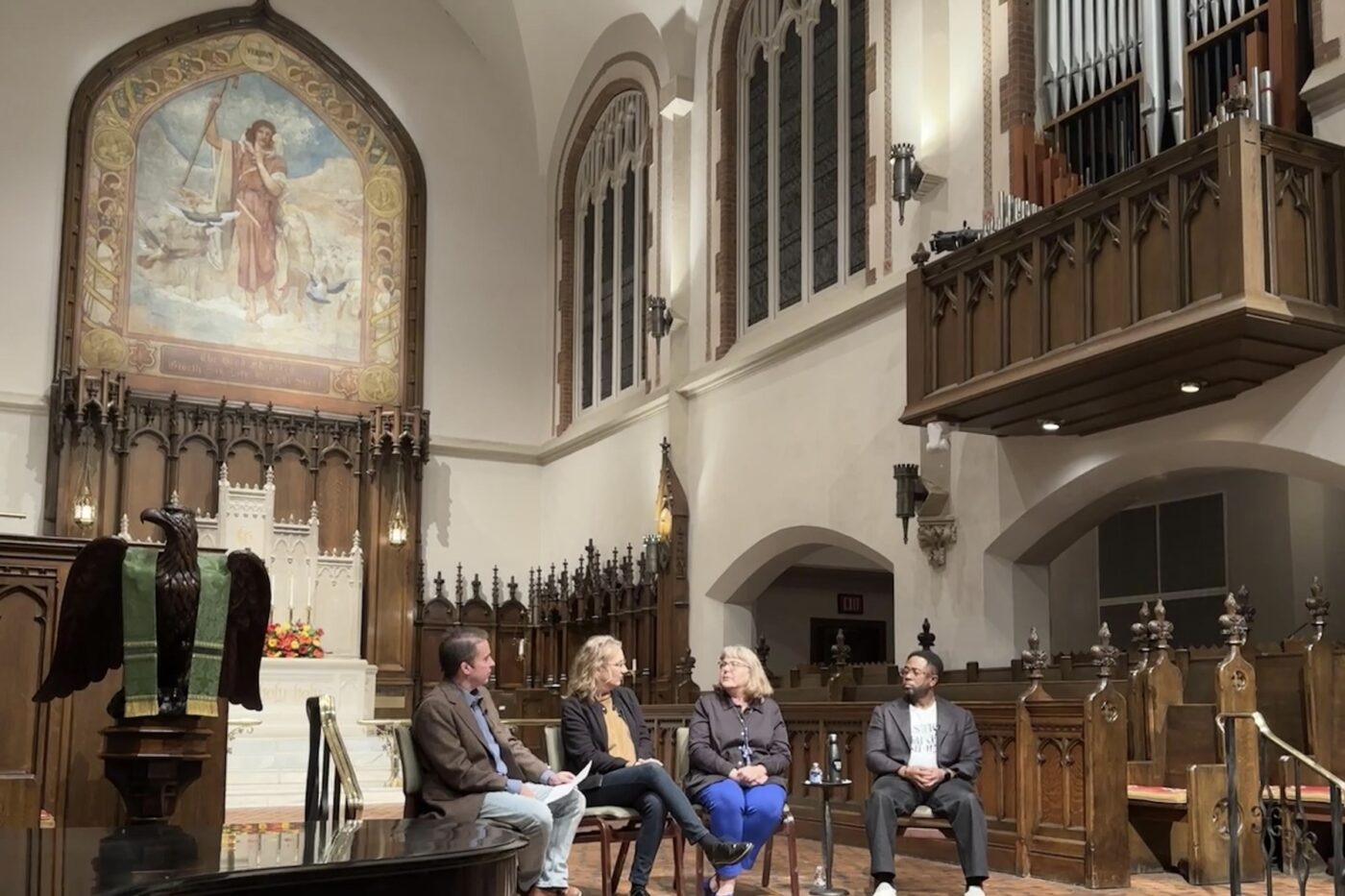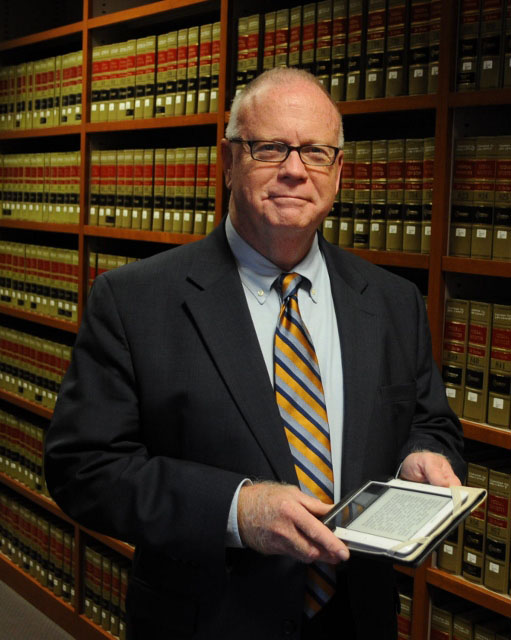
Four faith scholars and quartet of musicians are touring the nation seeking to equip individuals who share their progressive political leanings to educate others on how to promote the value of nonpartisan democracy.
The ecumenical cohort, calling themselves The Convocation Unscripted, includes award-winning Episcopal author, speaker, and preacher Diana Butler Bass; Public Religion Research Institute founder and sociologist Robert P. Jones; bestselling author and professor of history and gender studies, Kristin Du Mez; and professor of the history of race and religion Jemar Tisby.
Following events at a Methodist church in Tempe, Arizona, and a Baptist church in Greensboro, North Carolina, more than 250 people were drawn to St. Luke’s Episcopal Church in Atlanta on the evening of November 17 to hear the group’s free-wheeling conversation punctuated by performances from musical artists: Ruby Amanfu, Sam Ashworth, Taylor Leonhardt, and Tommy Sims.
St. Luke’s Rector Winnie Varghese said she immediately agreed when Bass called before the General Election seeking an Atlanta venue.
“It was just an easy yes,” Varghese said. “Whatever happened in the election, this is the kind of conversation we should be having in church, and I knew we’d be excited to have it here.”
Bass, author of Freeing Jesus: Rediscovering Jesus as Friend, Teacher, Savior, Lord, Way, and Presence, said the group formed earlier in 2024 to educate audiences on the democratic process and what’s at stake today from a historical and scholarly perspective.
Bass noted that the tour began prior to the Nov. 5th General Election.
“Mostly the idea was just to educate people about democracy, educate people about what is at stake, and not in a partisan way, but as historians, as scholars who focus on this area, as people who were watching very closely what is unfolding we just wanted to make sure that we could inform as many people as possible of what it was that we were seeing and trusting that they would act on it,” she said. “And now we’re on the other side [of the election] and have to think about how we respond faithfully in this moment and in the days ahead.”
Tisby, author of The Color of Compromise: The Truth about the American Church’s Complicity in Racism, and a history professor at Simmons College of Kentucky, a historically black, faith-based institution in Louisville said, “We learn from each other because we’re all researching different areas, talking to slightly different groups.”
“Robbie’s the numbers guy. So that’s different. But he coheres really well with the three of us who are all trained in American religious history. So, we share that collegial educational background and common language and the kinds of things you learn to be a professional historian. But at the same time, I think that the differences that we bring are from our theological backgrounds, from the different groups that are our kind of main people. We just have, I think, discovered we’re stronger together than separate. And we learn by keeping an ear open to all those communities that we’re part of,” Tisby said.
Du Mez, a professor of history at Calvin University and author of Jesus and John Wayne: How White Evangelicals Corrupted a Faith and Fractured a Nation, said America is at an intersection of history, racism, and social challenges.
“We really don’t know in specific terms what we will be facing two months from now, three months from now, six months from now, three years from now. So, it’s this almost eerie time because we’re trying to steel ourselves and prepare ourselves” she said.
Despite the uncertainty, Du Mez said individuals and communities should prepare for and respond to challenges.
“We don’t actually know exactly what we’re preparing ourselves for. So at this point, in this space, we’re talking about a spiritual groundedness and encouraging people to remind themselves of their core values, whether they are religious people or not, their core values as citizens, as humans, as people of faith, if they are people of faith, and to be ready to defend those values, whatever may come their way, ”she said.
Jones, author of The New York Times best-selling book The Hidden Roots of White Supremacy: and the Path to a Shared American Future, said his contribution to The Convocation Unscripted, which began as a writing project before morphing into an online podcast, is communicating with a mostly white audience.
“I think the thing that’s coming to me is that we are going to have to get comfortable with being uncomfortable, because I do think the kind of standing up for justice is going to take more than most white Christian people have ever been called on to do in the past,” Jones said. “So, I think fortitude, courage, willingness to be uncomfortable, and setting some bright lines where we say, okay, if this happens, we’re in. One of those, which we’re going to get very soon in the next administration, is rounding up undocumented immigrants and putting them into concentration camps. And we’ve seen that movie before, and we know where it goes.”
Pastor Jonathan Spencer of Open Circle Community Church near Stone Mountain, Georgia, said he attended the event due to his concerns about the state of the nation following the election results.
“I wanted to have an opportunity to hear from other people, their thoughts and feelings and ideas, and some motivation for my moving forward in a positive way as a person of faith, to try to make a difference and work for justice, Spenser said.
Paige Curley, a doctoral student in theology from McDonough, Georgia, whose faith background is in the Southern Baptist tradition, said she attended to hear directly from authors whose works are relevant to her studies, particularly in the context of current political discussions following the election.
Curley’s daughter-in-law, Deidre, said she is a history student transitioning to a teaching career. She wanted insights from the history professors about the importance of understanding past events to inform future decisions.
“I wanted to hear from professors of history about the importance of learning where we’ve been and how we got to where we are now so that we can move forward, aware of the situation and not just making a best guess, but making informed decisions as we go throughout life,” she said.
Daphne and Ryan from Tucker, Georgia said they have a Christian faith orientation but are not tied to a specific denomination.
Daphne said she came to the event “because I saw it recommended by a friend who I really respect and I think coming out of the election period and not really knowing what spaces are available for Christians who don’t align with Christian nationalism.”
Ryan said he came looking for “like-minded people or a place that was holding space for those of us who are not people of a particular faith who were not thrilled with the outcome of the election in terms of its implication for politics and democracy. “
Jones said each member of The Convocation Unscripted brings different strengths, such as expertise in American religious history, diverse theological backgrounds, and lessons from their life experiences. He said that their collaboration makes their message resonate across communities. The Convocation Unscripted now has a newsletter, YouTube channel, and a podcast for people seeking a deeper understanding of the complex dynamics between religion and American culture in a place for thoughtful dialogue on the challenges and opportunities that lie ahead, Jones said.
Varghese of St. Luke’s said after the event that her initial reaction proved to be right.
“These guys, because they’re sociologists and historians, can tell us what it’s meant in the past to struggle and frankly, to not speak out, to frame the need to speak out differently than my personal sense of urgency, or personal sense of crisis that we have in our congregation in our city,” she said.
“But to hear sociologically and historically what it has meant in times that we would all now say were violent and oppressive and wrong and when the church was wrong or the church was silent, and what the implications of our not finding our voice was; I find that very compelling in thinking about what we are to do today,” she said.

